| |
In 1998, Corman published his autobiography, entitled 'How I Made A Hundred Movies in Hollywood and Never Lost a Dime'. The title wasn't his choice but the publisher's. "I made more than a hundred films. And I lost a couple of times! I called the editor to say the title wasn't really correct, and he said, 'Has the title of every film you've made reflected exactly what was in it?'. I said 'Use any title you like!'." |
|
Roger Corman Interview by Tim Robey, The Daily Telegraph |
I initially came across Edgar Allan Poe's poem upon which this film is loosely based (and when I say loosely...) through parody. In fact, history tells us that no sooner was the poem out of the gate, so to speak, it was universally and mercilessly parodied. My introduction was via (what else?) an episode of The Simpsons and the reassuringly forceful (ahem), Vader-like tones of James Earl Jones. Despite the additional writing attached to this particular Halloween episode, mostly Bart's interjections, the Poe original still managed to unnerve. I was heartened to hear the same opening read by Vincent Price taking us into the movie... But this is no true horror film or the wanton unleashing of subconscious terrors. Writer Richard Matheson (famous for many more slightly more exalted works of popular culture) decided that he couldn't take the poem at all seriously so wrote the movie as an irreverent comedy and no one but Vincent Price could take all this howling ridiculousness and succeed in adding a pinch of his own character to make it so much fun.
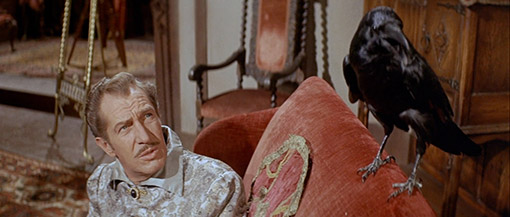
In short, in an unidentified country at an unidentified time (there are hints of the middle of Europe in the Middle Ages – lots of 'middle's), the magician Craven (Price) laments his lost love, Lenore. I'm sure Poe was unaware of the cleaning product when he wrote his poem but the German fabric conditioner is stuck, ear-worm like in my skull as in the following; "It's almost too soft for words..." Weg gehen! As Craven pines, he hears a knocking on his chamber door (that's a bedroom, right?) Try to catch The Simpsons episode because as far as I'm aware, they perform the poem in its entirety with a couple of interruptions and need I big up the attractiveness of Earl Jones' voice? It turns out to be a raven that knocks to come in and entering by the window, the black bird takes residence on top of a statue above the door. It says only one word infrequently... "Nevermore..." Screenplay writer Matheson will have none of that and promptly turns the grave, serious, doom-laden subject into high farce. Price implores the raven to tell him if he will ever hold his Lenore in his arms again... (too soft for words) "How the hell should I know?" says the raven... Not exactly a sepulchral "Nevermore..." but it has a comic potency all of its own. This is, of course, Peter Lorre in avian form, having been transfigured into a raven by a more powerful wizard, Scarabus (the great Boris Karloff). He's anxious to get turned back into himself and gets Price to procure the desperately silly magical ingredients to get this done. One of the required potion elements is dead man's hair. So naturally (ha!) Price nips down to the tomb of his deceased father, opens up the coffin, snips off what's needed and then barely bats an eye when the cadaver lurches to life, holding on to his son with an iron grip, mouthing the word "Beware!" The resemblance of the cadaver to Spock-Prime's Leonard Nimoy is a little freaky. The way this incident is treated by all concerned gives you the impression that this was a normal occurrence for a Tuesday afternoon. Only Price's raised eyebrow gives the audience any clue that this was a slightly odd thing to happen (for a Tuesday afternoon). Welcome to the insanity of normalcy that The Raven takes for granted.
One of the joys of The Raven is the utter and pronounced silliness in almost every scene – human beings behaving in ways no human beings ever behaved. Even the straight characters have their DNA of idiocy imprinted early on. It seems that master magician Scarabus can control people from afar making them do his murderous bidding. After failing to cleave his enemies in two with a manservant wielding an axe, his spells possess (of all people, Jack Torrance), sorry, Jack Nicholson. You'd think Jack could hold his own but he mugs, wide eyed with the best of them as he lashes the horses on to murderous intensity. Nicholson was a Corman regular until Easy Rider launched him into the stratosphere. Nicholson credits Corman with keeping him afloat during a decade of economic hardship, a relationship recalled that moves him to tears in the Corman documentary, Corman's World. Nicholson has one of the best deadpan lines in the movie as he edges out on to a dangerous ledge with a none too dangerous stock shot of an aspect ratio compromised ocean below him... Price's daughter says somewhat redundantly "But you might be killed..." Nicholson, in biting lip mode, says "I hope not..." As a young actor, Nicholson was strikingly dashing, one might say heroic.
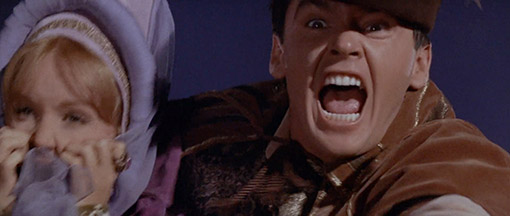
Once the disparate foursome end up at Scarabus' castle (matte paintings in full 'look at me, I'm a matte painting!' mode), Karloff presents himself as a man of reason and suggests that everything that paints him in a bad light has been a simple misunderstanding. But we all know that's a trap, right? Karloff, lisp in evidence, was parodied by another actor in a part that screams Mel Brooks and despite calling in favours, I've not been able to find out who this was and in what movie. It'll come to me. Karloff, of course, has the ex-dead Lenore in his clutches and despite the posturing, there's a chaste sense that he has no sexual hold over her at all. She's just content to be associated with him – the attraction of power. Given her buxom attributes which director Corman thrusts into the limelight, (as he would do given his instinctive, exploitative nature) it's hard (ooer) to see Lenore's power without an underpinning of sexuality. The woman simply radiates sex appeal. Of course, all this wand swinging is leading up to a duel, a wizards' face off, one in which you simply know (no spoilers surely) that Price will win. The special effects (for 1964) are a little not special – optical additions of beams of green jutting out from pointing fingers. These were pre-1967 Star Trek special effects and despite their rudimentary nature, I still applaud them. There is a dummy of Vincent Price that is a little obvious but to tell you the truth, the cheesiness of the effects is a significant part of the movie's charm.
And the amount of ham on display is juicy and well served. Price and Lorre make a fine double act, the first preternaturally calm, the other flustered as only a man with raven wings instead of arms can be. Lorre does stress like no other actor and even in The Raven, where the rules are pretty much made up as the filmmakers go along, he's convincingly put upon. And if his eyes bulged with indignation any more, they'd be running down his cheeks. There's a lot of fun to be had watching him boil over as he says to his son who's fussing over him just a shade too much, "If you do that once more, I'll smash you one right in the face!" And you believe him. Karloff is the more formal of the actors, apparently unhappy and uneasy when the rest of the cast indulged in some improvisation. But the overall mix is a heady cocktail of pure entertainment and knowing winks. Yes, the film is utterly bonkers but it hasn't a trace of cynicism and its playfulness never wears out its welcome. For sheer, insane fun, you'd have to travel far to find any film that comes close to delivering the comedic goods as much as The Raven.
As with Tales of Terror, the master for this transfer was created by MGM and delivered by Hollywood Classics, with additional picture restoration work carried out at Deluxe Restoration in London under the supervision of James White for Arrow Video. And like the transfer on the Tales of Terror disc, it looks absolutely lovely, clean of almost all dust and damage and sporting a strong level of detail, sublimely balanced contrast and a rich colour palette when the sets and costumes allow. Once again, this is as good as I've ever seen the film look. The aspect ratio is the original 2.35:1, of course.
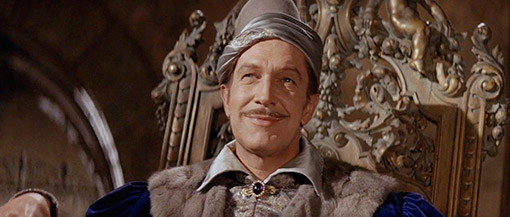
The Linear PCM mono 2.0 track is clean and clear and boasts a beefier reproduction of music and effects than you might expect. As with other films in this set, you can also watch the film with an isolated music and effects track, elements that play somewhat louder here than they do on the main soundtrack. This is particularly enjoyable during the magician's duel, when Les Baxter's lively score is at its most comically playful.
I also have to give a shout for montage of clips from the film that sit under the main menu, which have been so wittily cut to the the film's pacy end credits music that I sometimes put the disc on just to enjoy this. The punctuational moment when Price blows dust from a book is so exquisitely timed that it's prompted everyone I have sat in front of it to squeal with delight. Whoever was responsible for this sequence, bravo!
Peter Lorre: The Double Face (61:21)
A German documentary on Peter Lorre from 1984, this is about as po-faced a piece (no literary pun intended) as you can image. Driven by a soundtrack that consists solely of an unhappy-sounding female narrator and blending factual information with intellectualising and just a smidgen of artistic snobbery, it does follow a timeline through Lorre's career, but focuses on specific films (perhaps unsurprisingly, M is afforded a generous amount of screen time) and is big on thematic deconstruction, a few bits of which might find their way into Private Eye's Pseud's Corner. But there is still much here that is worthy of your time, particularly the information about (and clips from) some of Lorre's lesser seen films and his theatre work with Bertold Brecht, who held Lorre in particularly high regard as an actor. Our unhappy narrator is as dismissive of the Corman films as most highbrow critics seemed to be back in the day, but the analysis provided on some of his earlier work more than compensates for this foolishness. Due to the German preference for dubbing over subtitles (I seem to remember that British TV documentaries used to be as bad), Lorre biographer Stephen Youngkin is interviewed in English, dubbed in German, and then subtitled in English for our clarification.
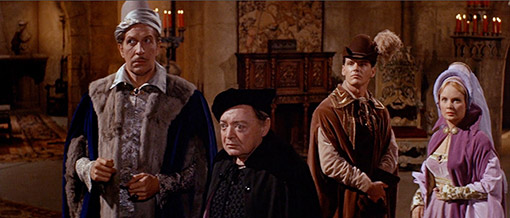
Richard Matheson: Storyteller (6:35)
A brief but welcome chat with screenwriter and author Richard Matheson, who describes himself as 'an offbeat writer' and explains why he decided to transform the poem into a comedy, describes Vincent Price as the nicest man he ever met in Hollywood, and reveals that at this stage in his life even walking was painful for Karloff, which is then illustrated by a clip from the film of him slowly descending stairs that makes you wince with understanding. He also states that few so-called scary actors realise just how funny they can be. He may be right.
Corman's Comedy of Poe (8:11)
In an interview conducted in 2003, Corman talks about the making of The Raven, which he describes as one of his favourite films (of the ones he directed). In contrast to the suggestion made in The Double Face that Lorre was really slumming it here, Corman recalls that it was Lorre who seemed to be having the most fun with improvisation, to the point where it started to flummox the more classically trained Karloff.
The Trick (12:19)
A well made gag of a short film directed by Rob Green, whose excellent adaptation of Poe's The Black Cat you'll find on the Tales of Terror disc. Here a silent conjurer auditions for a panel of self-satisfied 'Master Magicians' with a trick that... well, that's really for the film to reveal.
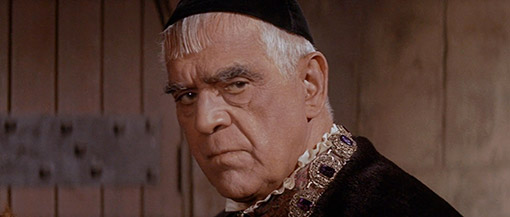
Gallery
57 production stills and a handful of posters, all in sparkling shape and at HD resolution. Use the chapter navigation on the remote to manually move through them.
Promotional Record (5:41)
An audio promotional tool that pushes the film as a work of "monstrous terror" and includes an intro by Karloff and has Lorre reading segments of Poe's original poem. You'd never know there was a moment of humour in the film from this – Karloff even suggests that it's so terrifying that "it may be the last picture you ever see" – but it's a valuable inclusion and a splendid listen, and the record artwork is presented on screen while it plays.
Theatrical Trailer (2:27)
"A tempest of thrilling terror!" we are assured as some carefully chosen extracts sweep any hint that this could be a comedy under the magic carpet. We can assume this was compiled before the completion of the film, as Karloff and Price's hand manipulation wizardry is shorn of its light rays here.
More genuine fun than any film adaptation of an Edgar Allan Poe poem has an right to be, The Raven really is an unpretentious delight from start to finish and has a main cast to die for. The transfer is lovely and the extra features are the sort that a true Corman Poe fan would lovingly assemble. Terrific.
|